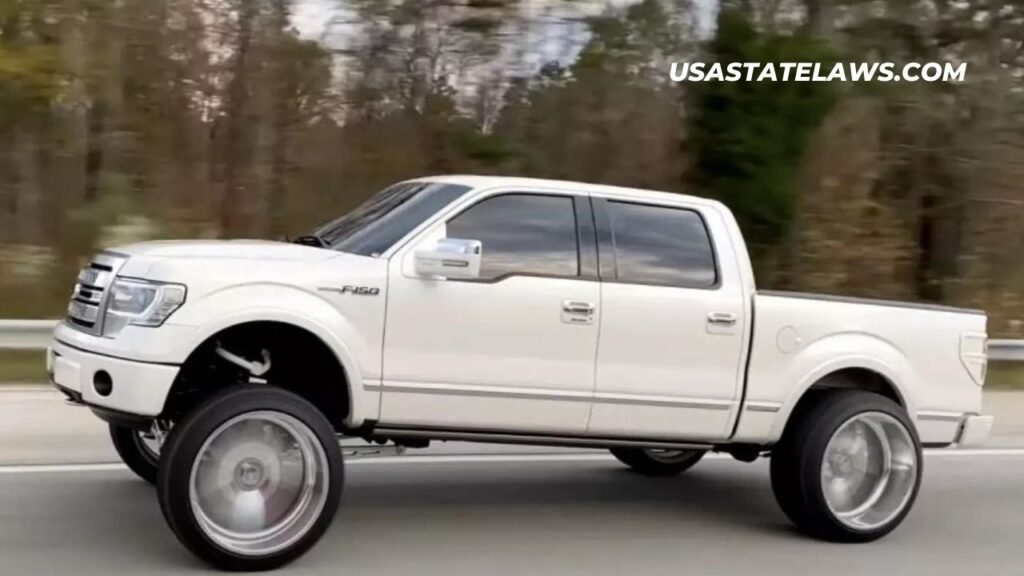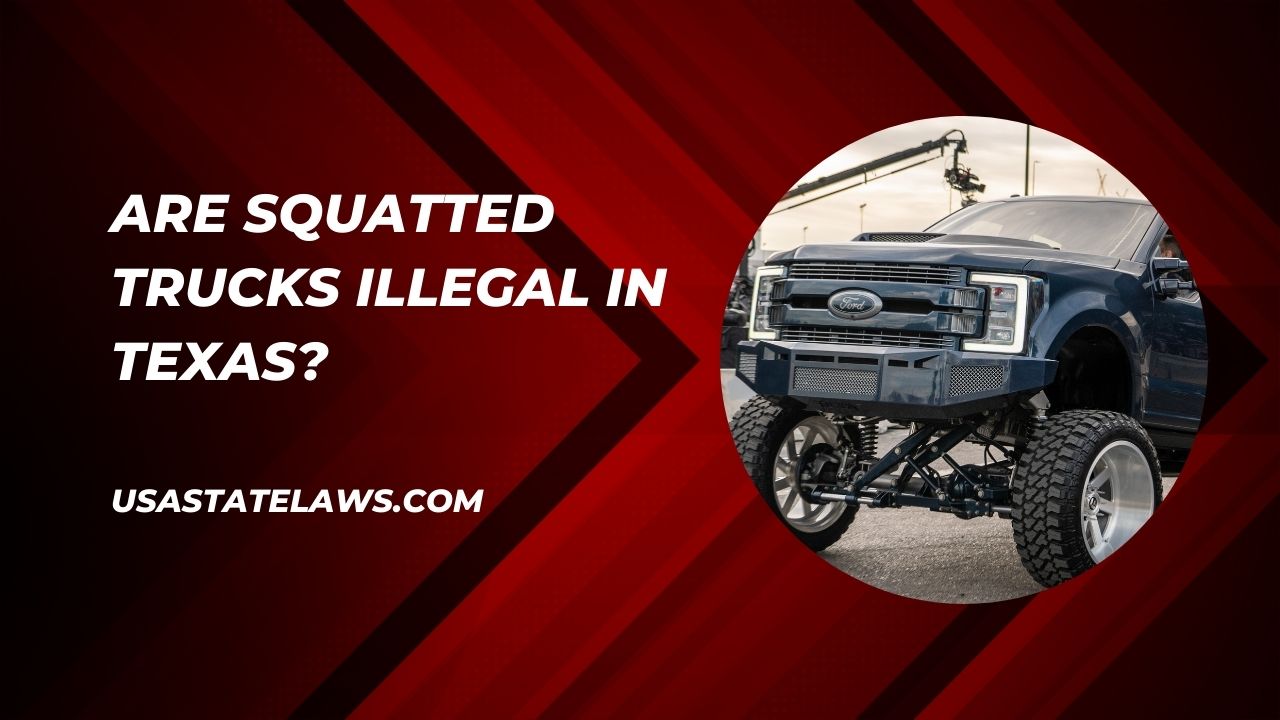Are Squatted Trucks Illegal In Texas? Squatted trucks are illegal in Texas as the state has banned modifications that raise the front of a vehicle more than four inches higher than the rear.
Squatted trucks, commonly known as the “Carolina Squat,” have gained a significant following among truck enthusiasts across the United States.
This unique modification involves raising the front of a truck while lowering the rear, creating a distinct sloped appearance.
While some fans appreciate the aggressive and bold look of squatted trucks, others criticize them for safety concerns.
In states like Texas, this debate has moved from garages and social media pages to legislative halls, resulting in regulations that impact vehicle owners.
In this article, we explore whether squatted trucks are illegal in Texas, the reasons behind the legal stance, and what truck owners need to know to stay on the right side of the law.
Contents
What Are Squatted Trucks?
Definition and Description:
Squatted trucks are vehicles modified to have the front end lifted significantly higher than the rear, creating a “squatted” or “leaning back” look.
This is typically achieved through alterations to the truck’s suspension system, such as installing a lift kit on the front axle while keeping the rear at a lower level or even lowering it further.
This gives the truck an unconventional, angled appearance that stands out on the road. [Are Squatted Trucks Illegal In Texas?]
Origin and Popularity:
The “Carolina Squat” style originated in the off-road communities of the Carolinas and quickly became a trend. [Are Squatted Trucks Illegal In Texas?]
It was initially popularized by desert racing trucks, which naturally squat while accelerating due to their suspension setup.
Over time, this became an aesthetic choice rather than a functional necessity, gaining popularity among those looking to give their trucks a unique look.
Social media platforms, particularly Instagram and TikTok, have significantly amplified the trend, with numerous influencers showcasing their squatted trucks and encouraging others to adopt this style.
Why Are Squatted Trucks Controversial?
Visibility and Safety Issues:
One of the main reasons squatted trucks have become a subject of controversy is due to the significant visibility and safety issues they pose.
When the front of a vehicle is raised too high, it can drastically limit the driver’s ability to see the road ahead.
This reduced visibility can make it challenging to spot obstacles, pedestrians, or even other vehicles, increasing the risk of collisions.
Additionally, the raised front end often causes headlights to point upwards, potentially blinding oncoming traffic at night, further contributing to the danger.
Impact on Vehicle Control and Handling:
Aside from visibility, the uneven suspension setup affects the overall handling of the vehicle. Squatted trucks can experience impaired steering and braking capabilities, making them more difficult to control, especially during emergency maneuvers.
The altered center of gravity can cause issues such as increased stopping distances, reduced tire traction, and instability when turning or navigating curves.
All these factors collectively compromise the safety of both the driver and other road users. [Are Squatted Trucks Illegal In Texas?]
Legal and Regulatory Concerns:
Due to the safety concerns associated with squatted trucks, many states have enacted regulations to control or outright ban this type of vehicle modification.
The main objective behind these regulations is to ensure that all vehicles on the road meet safety standards, thereby reducing the likelihood of accidents caused by unsafe modifications.
Texas, known for its large truck culture, is among the states that have taken a firm stance on the issue. [Are Squatted Trucks Illegal In Texas?]

Are Squatted Trucks Illegal in Texas?
Texas Legislation Overview:
Yes, squatted trucks are illegal in Texas. The state has specific laws regulating vehicle modifications to maintain road safety standards.
According to Texas transportation laws, any modification that raises the front end of a vehicle more than four inches higher than the rear is prohibited.
This law was enacted to prevent potential hazards associated with squatted trucks, ensuring that all vehicles on Texas roads provide a clear line of sight and balanced handling.
Specific Restrictions and Penalties:
Under Texas law, if a vehicle is found to have a front end raised more than four inches higher than the rear, it is considered non-compliant with safety standards.
Law enforcement officers have the authority to issue citations, fines, and even order the vehicle to be impounded if it poses a significant safety threat.
Vehicle owners may also face additional penalties, such as the suspension of their vehicle registration or the requirement to attend a court hearing.
Repeat offenders may encounter more severe consequences, including higher fines and potential legal action.
Recent Law Changes:
In recent years, Texas has been tightening its regulations regarding vehicle modifications, including those affecting suspension systems.
Several lawmakers have advocated for stricter enforcement to reduce road accidents and fatalities linked to unsafe vehicle alterations.
New bills and amendments have been introduced to create clearer guidelines and harsher penalties for violators. [Are Squatted Trucks Illegal In Texas?]
For truck owners, this means there is little to no room for ambiguity regarding what modifications are acceptable under Texas law.
Reasons Behind the Ban
Safety Considerations:
The primary reason for the ban on squatted trucks in Texas revolves around safety. When a vehicle is modified to have an uneven suspension, it can negatively impact both visibility and stability, creating a potentially dangerous situation on the road.
Authorities argue that the law helps ensure that all drivers have a clear view of the road and can safely operate their vehicles in various driving conditions.
With Texas having some of the busiest highways in the country, maintaining road safety is a priority.
Insurance and Liability Issues:
Insurance companies also play a role in the discussion about vehicle modifications like squatted trucks.
Many insurance providers may refuse to cover vehicles with illegal modifications or charge higher premiums due to the increased risk.
If a squatted truck is involved in an accident, the owner could face liability issues, especially if the modification is found to be a contributing factor.
This adds another layer of complexity and potential financial burden for truck owners. [Are Squatted Trucks Illegal In Texas?]
Public Opinion and Enforcement:
Public sentiment in Texas has also been largely against squatted trucks. Many drivers, safety advocates, and even members of the truck community agree that these modifications pose unnecessary risks.
Law enforcement agencies have received numerous complaints and reports from concerned citizens about the dangers posed by squatted trucks.
As a result, there has been a concerted effort to crack down on these vehicles, leading to increased enforcement and public awareness campaigns about the risks.
Comparison with Other States
States with Similar Laws:
Texas is not alone in its decision to ban squatted trucks. Several other states, such as North Carolina, South Carolina, and Virginia, have also enacted laws prohibiting extreme vehicle modifications that raise the front end too high.
These states have recognized the potential hazards and have responded with legislative action to curb the trend.
Differences in Regulations:
While the overall goal of promoting road safety is consistent across states, the specifics of the regulations can vary.
For example, some states might have different height limits or enforcement policies regarding squatted trucks. [Are Squatted Trucks Illegal In Texas?]
In some areas, the penalties for violations might be more lenient or severe, depending on local laws and the perceived risk to public safety.
Truck owners should be aware of these variations, especially if they plan to drive their vehicles across state lines.
What Should Truck Owners Do?
Compliance and Modifications:
Truck owners in Texas who have squatted trucks or are considering such modifications should be well-informed about the legal restrictions.
Compliance is crucial to avoid fines, citations, and other penalties. For those who want to personalize their vehicles, there are still many ways to do so while staying within the bounds of the law.
Owners should consider legal modifications that enhance both the aesthetics and performance of their trucks without compromising safety.
Alternatives to Squatted Trucks:
For those who enjoy modifying their trucks, there are several alternatives that are both stylish and legal in Texas. [Are Squatted Trucks Illegal In Texas?]
Options like leveling kits, lift kits that maintain even suspension, upgraded tires, or performance-enhancing modifications can provide a customized look without violating the law.
Other popular truck modifications include bed liners, custom lighting, winches, and performance exhaust systems, all of which can give a truck a unique appearance without sacrificing safety.
Consider Professional Guidance:
When modifying a truck, it’s always a good idea to seek professional guidance. Working with a reputable mechanic or custom shop can help ensure that all modifications comply with Texas laws and safety standards.
These professionals can also provide advice on how to achieve a desired look or performance boost without crossing legal boundaries.
Final Verdict
Squatted trucks are indeed illegal in Texas due to safety concerns and the state’s regulations on vehicle modifications. [Are Squatted Trucks Illegal In Texas?]
The ban is primarily motivated by the need to maintain visibility and control on the roads, ensuring the safety of all road users.
Truck owners should carefully consider their modifications to avoid legal trouble and prioritize safer alternatives that comply with Texas law.
By staying informed and making responsible choices, drivers can enjoy a unique and personalized vehicle while ensuring safety and legality.
See Also: Are Pitbulls Illegal In Texas?
FAQs
What happens if I’m caught driving a squatted truck in Texas?
If caught driving a squatted truck in Texas, you may face fines, citations, or even vehicle impoundment until the vehicle is modified to comply with Texas law.
Are there any exceptions to the law for squatted trucks in Texas?
No, Texas law does not provide exceptions for squatted trucks with a front end more than four inches higher than the rear.
Can I drive a squatted truck in neighboring states?
It depends on the specific laws of each state. Some states may allow squatted trucks, while others have similar restrictions. [Are Squatted Trucks Illegal In Texas?]
What other types of vehicle modifications are illegal in Texas?
Modifications that affect vehicle safety, such as excessively loud exhausts, illegal window tints, and improper lighting, are also restricted.
How can I report a squatted truck violation in Texas?
You can report non-compliant vehicles to local law enforcement or through Texas Department of Public Safety channels.
Conclusion: Are Squatted Trucks Illegal In Texas?
Understanding the laws surrounding vehicle modifications is crucial for truck owners in Texas. Squatted trucks, while a popular trend, are illegal due to the safety risks they pose.
By choosing modifications that prioritize safety and comply with legal standards, truck enthusiasts can enjoy a customized vehicle that’s both stylish and road-legal.
Texas truck culture thrives on individuality, but safety and legality must always come first. Stay informed, modify responsibly, and keep Texas roads safe for everyone.

Hello guys, I’m Trey Simpson from Los Angeles. After completing my J.D., I noticed a lack of clear information online about laws in different U.S. states. So, I created this blog to help. Now, I’m a lawyer and continue blogging. Thanks for visiting!

